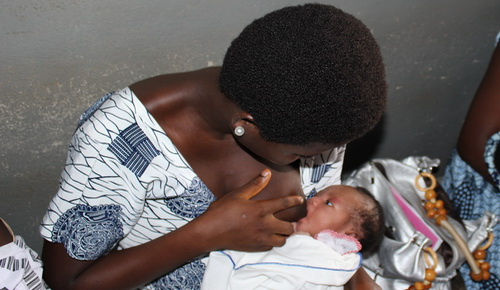
Breastfeeding within an hour of birth : Saves newborns
Thousands of newborn babies die every year in Ghana simply because the initiation of breastfeeding is delayed at birth. Delaying breastfeeding by two to 23 hours after birth increases the risk of a newborn dying within the first 28 days of life by 40 per cent. Delaying it further by 24 hours or more increases the risk of death by 80 per cent.
Advertisement
During the normal process of birth, the newborn baby is delivered unto the mother’s abdomen, dried thoroughly and placed in skin-to-skin contact on the mother’s chest to initiate breastfeeding. Placing the baby in skin to skin contact with the mother does not only provide warmth but also helps with successful breastfeeding and protects the baby from infection. “If we keep newborns in the right place (in skin-to-skin contact with the mother), at the right time (immediately after delivery for at least one hour), they will do the right thing (initiate breastfeeding)”. No baby should be deprived of the first milk also known as colostrum, which is the baby’s first immunisation; it is very high in antibodies and essential nutrients to protect the newborn from infection.
At the fifth National Newborn Stakeholders Meeting in Accra which was held from July 26-28 2016, The United Children’s Fund (UNICEF) clearly demonstrated overwhelming evidence that early initiation of breastfeeding (EIBF) reduces neonatal mortality and early skin-to-skin contact immediately after delivery facilitates successful breastfeeding. Access to health services has increased in, Ghana with seven out of 10 women delivering in health facilities.
According to the 2014 Ghana Demographic Health Survey (DHS) report, nearly nine out of 10 women who delivered in a health facility in Ghana breastfed their newborns within 24 hours after birth. Unfortunately, only six out of these women initiated breastfeeding early within the first hour - a missed opportunity to provide quality care to save our newborns from dying.
Over the years, survey reports in Ghana have shown rural-urban differences in newborn deaths in favour of the urban population. The 2014 DHS report has revealed a different trend all together, with most of our newborn deaths occurring in urban areas and among the richest households. The reason is simply delay in the initiation of breastfeeding and lack of exclusive breastfeeding.
The Ghana Health Service, in a recent meeting supported by UNICEF, identified a number of causes for delay in initiating breastfeeding. Initiating breastfeeding around the time of birth has not been a priority for staff in the delivery room as other after birth activities such as weighing the baby take precedence over initiating breastfeeding. Inadequate pain management for mothers who have undergone a caesarean section, lack of support from health staff, the community and even the government for mothers to initiate breastfeeding early and continue to breastfeed exclusively; and introduction of formula feeds and water by mothers and family members due to misconceptions of no milk after delivery are some of the reasons why breastfeeding initiation is delayed.
“My mother-in-law advised me to give my baby water because the weather is hot and I find it difficult to say no,” a mother who had just been delivered of her baby said.
“I wanted to give breastmilk to the baby the same day of birth but I was dizzy and weak from the birth and I needed rest so I waited until the next day,” a first time mother said.
The importance of early skin-to- skin contact at birth and early initiation of breastfeeding needs to be highly prioritised during antenatal care counselling services in our health facilities and training institutions.
There should be a strong commitment at the national, regional and community levels to increase support for mothers to initiate breastfeeding early and adapt breastfeeding positions that are comfortable for them. Regions and districts can leverage on community platforms to advocate early and exclusive breastfeeding through mother-to-mother and father-to-father support groups, pregnancy schools and religious groups, and target key decision makers in the family.
As we celebrate World Breastfeeding Week, let us remember that the early initiation of breastfeeding within the first hour of birth and exclusive breastfeeding is for every mother and every baby.”
The writer is a Health Specialist (Maternal and Newborn Health) with UNICEF in Ghana



